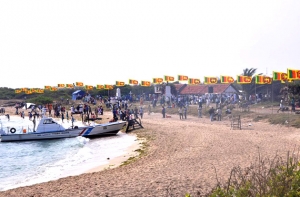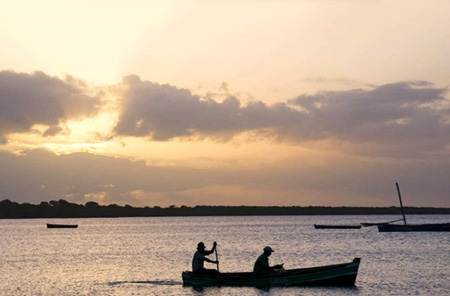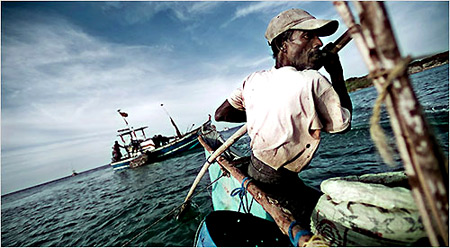
Tuesday,22nd July 2014
By Lakshman I.Keerthisinghe LLB, LLM.MPhil, Attorney-at-Law

I shall prove it as clear as a whistle - John Byron-Epistle to Lloyd
It was reported in the media that DMK president M. Karunanidhi opposed in the Indian Supreme Court the Centre's stand that Katchatheevu belonged to Sri Lanka in the light of the 1974 agreement and said the sovereignty over the islet 'was never with Ceylon but with India.' The court granted Karunanidhi four weeks to file his rejoinder; but he filed his reply within a day of the hearing. He prayed that the islet be retrieved and the agreement declared null and void. Karunanidhi said: “The status of Katchatheevu cannot be taken to have been settled by the 1974 agreement. Important historical documents and records prove that India's sovereignty over the islet was not taken into consideration while the so-called 'Agreement on the International Maritime Boundary line in historic waters between India and Sri Lanka and related matters' was signed in 1974.
He said the failure to follow the procedure mandated by the Constitution vitiated the agreement, which was neither legal nor constitutional. Such an unconstitutional agreement cannot settle the status of Katchatheevu, nor could it cede the island to Sri Lanka then Ceylon. Referring to the exchange of letters between the then Foreign Secretary, Kewal Singh, and W.T. Jayasinghe, Secretary to the Sri Lankan Ministry of Defence and Foreign Affairs, Karunanidhi said these letters did not give the agreement any legal sanctity. The letters said: “The fishing vessels and fishermen of India shall not engage in fishing in the historic waters, the territorial sea and the exclusive economic zone of Sri Lanka, nor shall the fishing vessels and fishermen of Sri Lanka engage in fishing in the historic waters, the territorial sea and the exclusive economic zone of India without the permission of Sri Lanka or India.”
 British rule
British rule
Kachchathiva or Katchatheevu or Kachchativu in Tamil is a controversial uninhabited island administered by Sri Lanka. The island was originated because of oceanic eruption happened on 14th century, Rameshwaram also originated because of the same eruption. The island was originally owned by Ramanad Kingdom of Ramanathapuram district (Tamil Nadu) before Indian independence.
In 1974, India recognized the Sri Lankan ownership to the island on a conditional agreement. It has a Catholic shrine and has been declared as a sacred area by the government of Sri Lanka. This 285-acre (1.15 sq km) island is situated on the Sri Lankan side of the maritime boundary Ownership of the island was controversial up until 1974 as during British rule this island was administered by both countries. India recognized Sri Lankan ownership. The legality of the transfer is challenged in the Indian Supreme Court since the recognition was not ratified by the Indian Parliament.
Historical facts
This recognition of an island that is culturally important to fishermen of Tamil Nadu state in India has led to some agitations by Tamil Nadu politicians that it should be claimed to Indian sovereignty. The island is also important for fishing grounds used by fishers from both the countries. The Indo-Sri Lankan agreement allows Indian fishermen to fish around Katchatheevu and to dry their nets on the island. But as part of the Sri Lankan ethnic conflict, this arrangement has led to many difficulties with the Sri Lankan Navy that is deployed to prevent smuggling of weapons by the rebel group LTTE. The island has a Catholic Shrine that attracts devotees from both the countries.
In 2009, Tamil Nadu Government declared that the area is controlled by the Sri Lanka against the original pact of allowing Indian fishermen to access the water of Sri Lanka. The Sri Lankan government allowed a full access term to Indian fishermen till Jaffna Line and released the fishermen jailed for a while. The problem continue to grow as more fisherman move into the Sri Lankan sea area. In 2010 the Sri Lankan government issued a notice to the Tamil Nadu government saying the Indian court cannot nullify the 1974 agreement.
In June 2011, the new Tamil Nadu government led by Jayalalithaa filed a petition in Supreme Court seeking the declaration of the 1974 and 1976 agreements between India and Sri Lanka on ceding of Katchatheevu to Sri Lanka as unconstitutional. However, the Indian government has stated that 'No territory belonging to India was ceded nor sovereignty relinquished since the area was in dispute and had never been demarcated' and that the dispute on the status of the island was settled in 1974 by an agreement, and both countries took into account historical evidence and legal aspects.
St.Anthony's Catholic Shrine is one of a kind which shares the borders of both countries India and Sri Lanka, and declared a holy place by the Sri Lankan Government. There stands the only religious structure, St.Anthony's Catholic Shrine which holds a hundred year old traditions, was built by an Indian Catholic Tamilian called Srinivasa Padaiyachi. No one was required to possess Indian passport or Sri Lankan visa for visiting Kachchatheevu. The church festival runs for three days. Priests from both India and Sri Lanka conduct the mass and car procession. As many as 35 country boats and 106 mechanized boats ferried the pilgrims, mostly from Rameswaram, there is not a drop of drinking water on the island and the only structure is the church named after St. Anthony, patron-saint of seafarers, to whom the feast is dedicated. It was put up by a prosperous fisherman in the early 20th century. But there is no shelter, no food, and nothing to sight-see, except the surrounding choppy blue waters of the Palk Straits.
It is to be noted that as stated above Kachchativu is a barren island that lies about 15 miles North-East of Rameshwaran and approximately 14 miles South-West of Delft Islands. There are no permanent inhabitants or any permanent structures on the Island other than a Roman Catholic Church, administered by the Bishop of Jaffna as part of his Diocese. What makes the island attractive is the richness of the surrounding seabed around Kachchativu with prawns, chank shells, pearl oysters and corals. Government of Sri Lanka (GOSL) had always maintained a consistent policy founded on historical facts on the issue of the ownership of Kachchativu.
Sri Lanka consistently and regularly exercised of jurisdiction and control over Kachchativu. In this context, Sri Lanka's claim to Kachchativu was listed in 1924 in a correspondence stating that Survey Officers of the Government of India (GOI) treated the island as a part of then Ceylon as far back as 1876. Moreover Kachchativu Island has been under the jurisdiction of Sri Lanka since the time of Portuguese and later the British rulers of Sri Lanka (then Ceylon).
The issue of Kachchativu first arose in 1921, at the Conference to demarcate fisheries line between India and Sri Lanka and was followed by a series of bilateral discussions, relating to maritime boundary demarcation and related matters. However, the two Parties were able reach an Agreement for the first time in 1974.The 1974 Agreement regarding historic waters between Sri Lanka and India in the Palk Strait and the Palk Bay formally confirmed Sri Lanka's sovereignty over the Island.
Article 4 of the Agreement stipulates that each State shall have sovereignty and exclusive jurisdiction and control over the waters, the Islands, the Continental Shelf and the sub soil on its side of the Maritime boundary in the Palk Strait and Palk Bay and Kachchativu Island was determined as falling within Sri Lankan waters.
Article 5 of the 1974 Agreement provides that 'Subject to the foregoing, Indian fishermen and pilgrims will enjoy access to visit Kachchativu as hitherto, and will not be required by Sri Lanka to obtain travel documents or visas for these purposes.' Article 6 of the Agreement states that, “The vessels of India and Sri Lank will enjoy in each other's waters such rights as they have traditionally enjoyed therein.”
By this Article, only navigational rights of the vessels of both Sri Lanka and India over each others waters have been preserved.
 The preparatory notes leading to the finalization of the rights of the two Parties, clearly manifests that the rights of pilgrims under Article 5 were restricted to attend the annual feast of the church and the rights of access of fishermen was restricted to dry their nets and catch. Therefore the provisions in Article 5 and 6 taken together do not confer any fishing rights on the Indian fishermen or vessels to engage in fishing in Sri Lankan waters. As follow up to this process, an Agreement between Sri Lanka and India on the Maritime Boundary between the two countries in the Gulf of Mannar and the Bay of Bengal and related matters was signed in 1976.
The preparatory notes leading to the finalization of the rights of the two Parties, clearly manifests that the rights of pilgrims under Article 5 were restricted to attend the annual feast of the church and the rights of access of fishermen was restricted to dry their nets and catch. Therefore the provisions in Article 5 and 6 taken together do not confer any fishing rights on the Indian fishermen or vessels to engage in fishing in Sri Lankan waters. As follow up to this process, an Agreement between Sri Lanka and India on the Maritime Boundary between the two countries in the Gulf of Mannar and the Bay of Bengal and related matters was signed in 1976.
This Agreement further clarifies the position established by the 1974 Agreement between Sri Lanka and India.
Article 5, of 1976 Agreement stipulates that;
1. Each Party shall have sovereignty over the historic waters and the territorial sea, as well as the islands falling on its side of the aforesaid boundary.
2. Each Party shall have sovereign rights and exclusive jurisdiction over the Continental Shelf and the Exclusive Economic Zone (EEZ) as well as over their resources, whether living or non-living, falling on its side of the aforesaid boundary.
3. Each Party shall respect rights of navigation through its territorial sea and exclusive economic zone in accordance with its laws and regulations and the rules of international law.
The 1974 and 1976 Agreements taken together with the Exchange of Letters, that was signed between Mr. Kewal Singh, the then Foreign Secretary to the Government of India, and Mr. W.T. Jayasinghe, then Secretary to the Ministry of Defence and Foreign Affairs of Sri Lanka, has put the question of fishing rights beyond doubt. Paragraph 1 of the Exchange of Letters very clearly rules out any fishing rights for the fishermen of the two States in the waters of the other State which reads as follows;Fishing vessels and fishermen of India shall not engage in fishing in the historic waters, the territorial sea and the EEZ of Sri Lanka nor shall the fishing vessels and fishermen of Sri Lanka engage in fishing in the historic waters, the territorial sea and the EEZ of India, without the express permission of Sri Lanka or India, as the case may be.
Therefore it is observed that with the signing of the 1976 Agreement and the Exchange of Letters, the maritime boundary between Sri Lanka and India stands settled, and the Letters of Exchange clearly prohibits fishing vessels and fishermen of one country fishing in the others' waters. Subsequent to the conclusion of the Agreements, the question of fishermen inadvertently straying into each others' waters has been discussed at several bilateral meetings between the officials of the two States. On several occasions, the Sri Lankan Navy has been accused of being involved in alleged attacks on Indian vessels near Kachchativu Island.
Sri Lanka Navy has categorically denied any involvement in such activities as they do not venture out of Sri Lankan territorial waters. In fact contrary to the allegations, the Sri Lanka Navy has on a number of occasions assisted and continues to assist the Indian fishermen in distress. Meanwhile several personalities in Tamil Nadu State have recently raised the issue of Kachchativu, making proposals based on their own perceptions without any apparent valid legal basis, pertaining to the rights of Indian fishermen. In fact there has been a case filed by the former Chief Minister of Tamil Nadu Ms. Jayalalithaa at the Indian Supreme Court. However, a decision given by a Court of law in a jurisdiction outside Sri Lanka would not be binding on Sri Lanka. Any such Court Order or judgment will not alter or have an impact on a bilateral treaty concluded between two sovereign States.
In conclusion, Kachchativu has always been the territory of the Sri Lankan state according to historical evidence and records of exercise of jurisdiction and this has been cemented by the Agreements of 1974 and 1976 and the related Exchange of Letters whereby India accepted Sri Lanka's sovereignty over Kachchativu. Although Karunananidhi appears to be fishing in troubled waters as John Byron said in his epistle to Lloyd the Government of Sri Lanka has already proved it as clear as a whistle that Kachchativu belongs to Sri Lanka prior to the signing of the relevant agreements as stated above.
From: http://www.dailynews.lk/?q=features/katchatheevu-ours-clean-whistle




